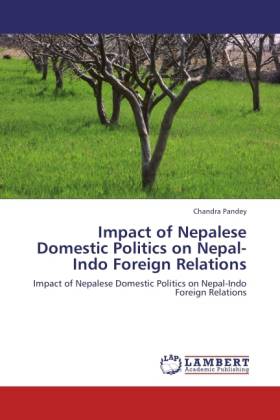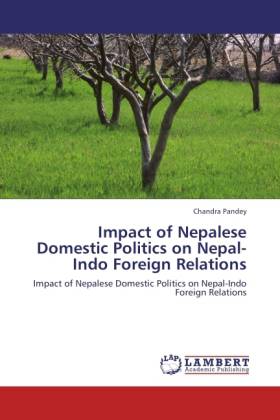
- Afhalen na 1 uur in een winkel met voorraad
- Gratis thuislevering in België vanaf € 30
- Ruim aanbod met 7 miljoen producten
- Afhalen na 1 uur in een winkel met voorraad
- Gratis thuislevering in België vanaf € 30
- Ruim aanbod met 7 miljoen producten
Zoeken
Impact of Nepalese Domestic Politics on Nepal-Indo Foreign Relations
Impact of Nepalese Domestic Politics on Nepal-Indo Foreign Relations
Chandra Pandey
Paperback | Engels
€ 48,45
+ 96 punten
Omschrijving
Nepal's efforts to maintain its national identity, geopolitical importance and development solely depend on the stability of Nepalese domestic politics and a systematic articulation of foreign policy to deal with two powerful neighbors among others. Nepalese politicians often accused Monarchy until 2006. As Monarchy was ousted, they changed the tune and are blaming India's interference in Nepalese political issues. Yet, the politicians have not realized that it is unstable domestic politics of Nepal that let foreign countries to meddle with Nepalese matters. This study explores how pathetic Nepalese domestic politics is and how quickly the governments changes occur in Nepal due to the power clinging attitudes of Nepalese politicians. It elaborates on how the roles of rivals in domestic politics of Nepal among the political parties and power interested groups produced negative impacts on Nepal's stability, development and gives rise to foreign or Indian interference.
Specificaties
Betrokkenen
- Auteur(s):
- Uitgeverij:
Inhoud
- Aantal bladzijden:
- 96
- Taal:
- Engels
Eigenschappen
- Productcode (EAN):
- 9783846528235
- Verschijningsdatum:
- 17/10/2011
- Uitvoering:
- Paperback
- Formaat:
- Trade paperback (VS)
- Afmetingen:
- 152 mm x 229 mm
- Gewicht:
- 149 g

Alleen bij Standaard Boekhandel
+ 96 punten op je klantenkaart van Standaard Boekhandel
Beoordelingen
We publiceren alleen reviews die voldoen aan de voorwaarden voor reviews. Bekijk onze voorwaarden voor reviews.











